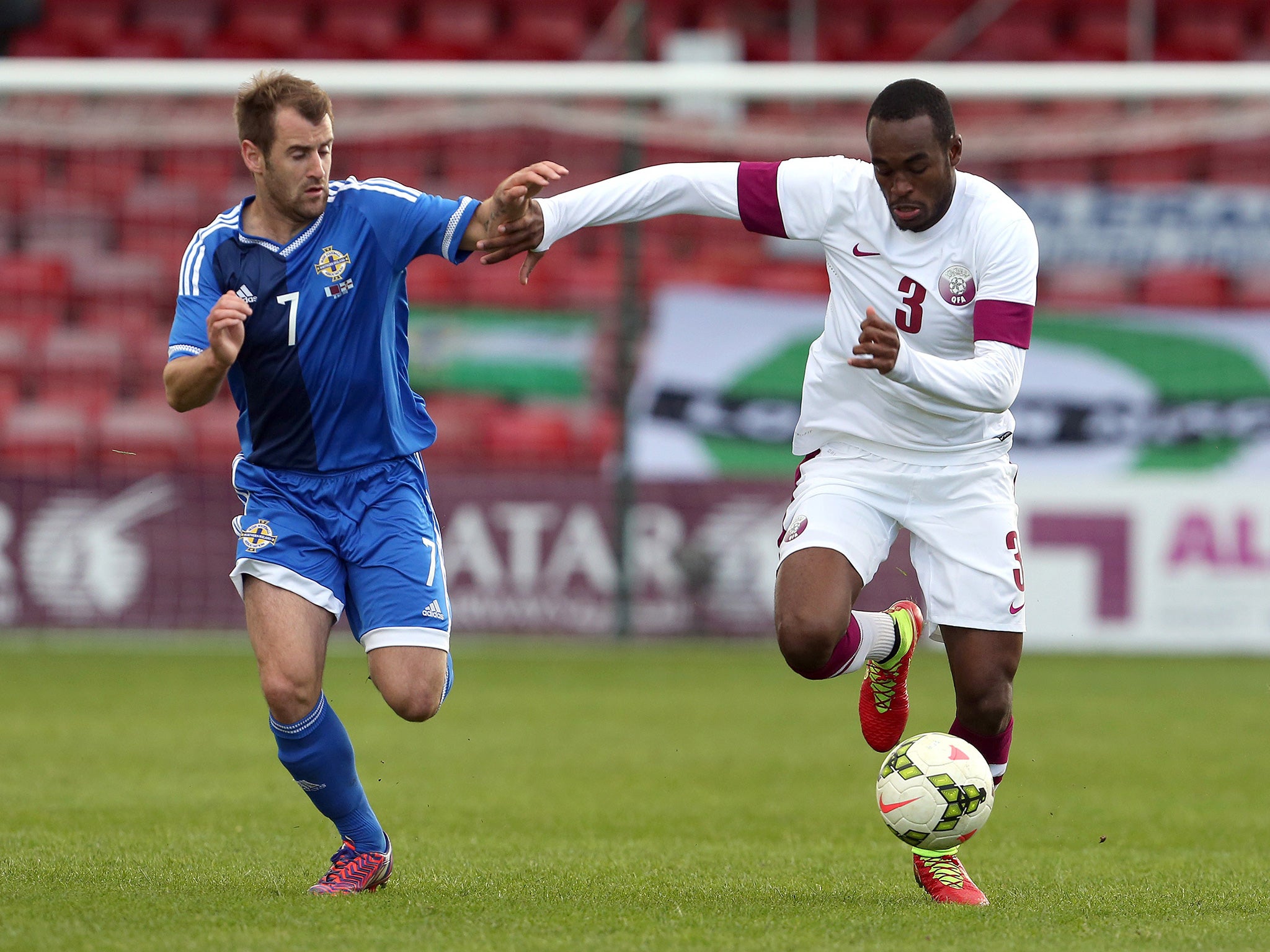It was hardly a vintage encounter and on 22 minutes the inevitable happened, when the 3,000 or so Northern Ireland fans reached for their wallets, pulled out whatever was in there, waved it in the air and chanted: “How much did you pay for / the Fifa World Cup?”
The travelling Qataris offered nothing by way of a comeback but who can blame them? There were only four of them in the entire stadium and they were all on the pitch.
As migrant labour jobs go, the coalition of Ghanaians, Egyptians, Algerians and Sudanese that make up the bulk of Qatar’s national football team haven’t done too badly. The sun shone briefly towards the end of the first half as they toiled away on Crewe Alexandra’s Gresty Road pitch, but the temperature peaked at a manageable twelve degrees.
Then there’s the fact these guys, unlike many of their countrymen, haven’t been made to hand over their passports. Rather they’ve had brand new ones handed to them, and with it comes the life of an international footballer, and only a few of them have had to go through the minor matter of converting to Islam to get it.
(The left winger Mohammed Tresor Abdullah was known as Tresor Kangambu when he grew up in the DR Congo, before deciding to follow the prophet.)
The Fifa bigwigs facing charges
Show all 14In one or two cases, the life choices of these men have proved particularly controversial. The tall and fluid 21 year old Mohamed Muntari moved with languid poise and intent in front of Northern Ireland’s back four all afternoon. He was considered to be one of the most promising youngsters at the former international Nii Lamptey’s academy in Ghana, but when he left to play for El Jaish SC in the Qatar Stars League two years ago, his home country stopped monitoring his progress and in December made his international debut for Qatar in a friendly against Estonia, and scored.
Just after half time, Brentford’s Stuart Dallas had fired past the French born Amine Lecomte in the Qatar goal amid a defensive resistance which would be generous to call futile.
Qatar’s equaliser in the 75th minute, via a bending volley from the French Algerian substitute Karim Boudiaf was by some margin the brightest moment in the match. But the current 99th ranked team in the world, demonstrated exactly why there are scarcely among the hundred greatest football playing nations. As things stand, come 2022 they will be the worst side ever to take part in a World Cup tournament. Before then, their Uruguayan coach Jose Daniel Carreno will only focus on qualifying the 2018 tournament. “We have a lot of hopes, a lot of dreams. but a lot of work to do.”
The players have been training at England’s facility St George’s Park, and their PR people have been on the charm offensive. But since the Swiss Police raided Fifa’s Baur Au Lac Hotel on Wednsesday morning all channels have gone dark.
Of the home grown players, Abdelaziz Hatem, the captain is only 24 and has clear ambitions to take part. But his country hopes its fortunes will have been transformed by then.
Its imperialist footballing tentacles are reaching into every corner of the world to achieve it. Many of its current squad had come via its international Aspire Academy, that has centres in Asia, Africa and Latin America, scouting and channeling talent to its giant blue Aspire Dome on the outskirts of Doha, with facilities impressive enough to have lured Manchester United and Bayern Munich to train there. Its director, Ivan Bravo, once director of strategy at Real Madrid denies its mission is to give talented kids a chance in life, and not to build a team from all over the world capable of challenging at its home World Cup. It is, of course, distinctly possible that both are true.
“I can understand why a country like Qatar has to take that route,” said Northern Ireland’s manager Michael O Neill. “But the international game is the part of the game least affected by finance. If you go down the naturalisation route, where do you stop? International football could lose its identity.”
Transforming Qatar’s football culture will be even harder. Northern Ireland’s fans scarcely stopped chanting all afternoon, and this being an unofficial match, many of them took full advantage of the rare permission to drink beer on the terraces. Qatar’s World Cup organisers are talking about installing tablets in the backs of seats to provide “interactive content” during matches. It would mark a culture shift that much of the game simply doesn’t want.
And while the journey from Doha to Crewe would test the mettle of even the most committed travelling football fan, even with match day tickets for a fiver and a quid for concessions, the Gresty Road demographics reveal much of the problem Qatar must overcome. Not a fan in sight. Even Qatari football’s dishdasha’d overlords were conspicuous by their absence.
When the great Xavi joins the Qatar Stars League from next season, he will have to get used to being watched chiefly by small crowds of migrant labourers, bussed in on their day off and, in some cases, even paid a small amount to be there.
Still, for the team at least, the next stop is a friendly against Scotland on Friday and after that comes the first step on the road to Russia 2018. Qualification begins on June 11th with a difficult match in the Maldives. Nice work if you can get it.
Subscribe to Independent Premium to bookmark this article
Want to bookmark your favourite articles and stories to read or reference later? Start your Independent Premium subscription today.


Join our commenting forum
Join thought-provoking conversations, follow other Independent readers and see their replies